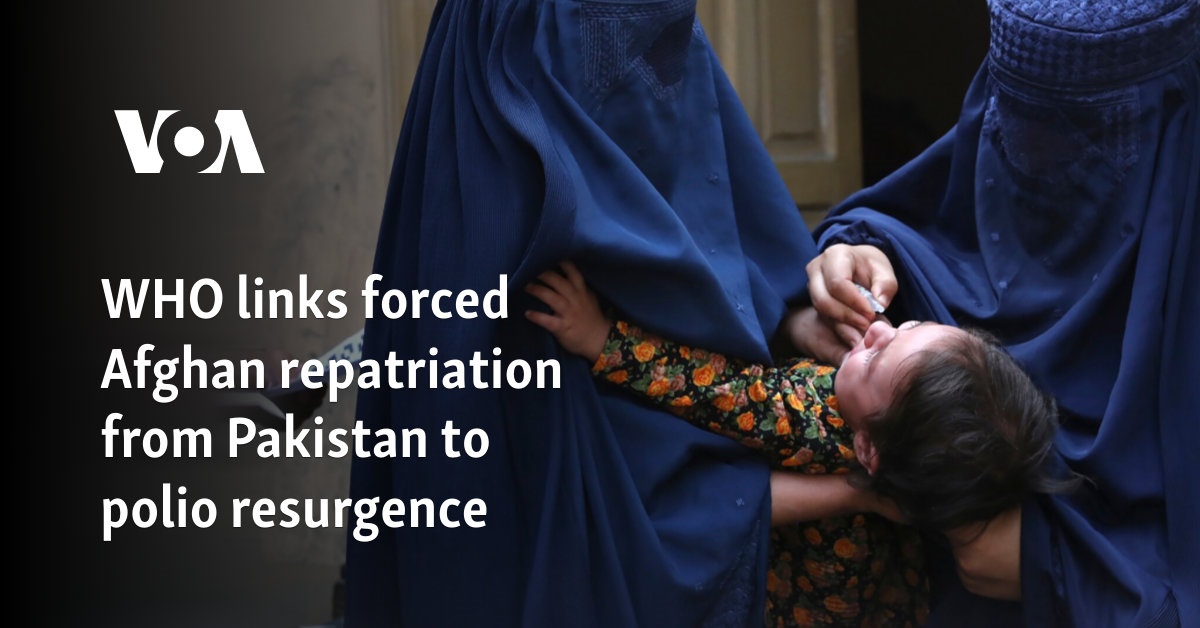The World Health Organization has labeled a forced repatriation of Afghan nationals from Pakistan as a “major setback” for polio eradication efforts, contributing to the regional resurgence of the paralytic disease.
Pakistan and neighboring Afghanistan are the only two polio-endemic nations, reporting 49 and 23 cases respectively, so far this year, up from only six cases each in 2023.
The latest case in Pakistan was confirmed Thursday in the southwestern province of Balochistan, which sits on the Afghan border and accounts for half the cases reported in 2024.
“Until you get rid of polio completely, it will resurge and come back, and this is what we are seeing now in Pakistan [where] nearly half of the districts are infected, and in Afghanistan, a third of the provinces are infected,” Hamid Jafari, the WHO director for the Eastern Mediterranean, said Wednesday while discussing causes of polio resurgence in both countries.
“I think the major setback was a forced repatriation of Afghan nationals that led to a massive and unpredictable movement of populations within Pakistan and across both borders and within Afghanistan, so the virus moved with these populations,” Jafari told the virtual discussion hosted by the Global Polio Eradication Initiative, or GPEI.
The United Nations High Commissioner for Refugees has said that Pakistan’s crackdown on undocumented foreign nationals has resulted in more than 730,000 Afghan migrants returning to Afghanistan since August 2023.
Jafari also mentioned other factors contributing to the rise of polio in Pakistan, including authorities’ inability to consistently carry out vaccination campaigns in areas affected by militancy, where children cannot be effectively immunized against the crippling disease. He also highlighted the presence of “significant vaccine hesitancy and community boycotts” rooted in public frustration over the lack of essential services in impoverished districts.
Pakistani and WHO officials say vaccine boycotts in some regions also result from the false propaganda that anti-polio campaigns are a Western plot to sterilize Muslim children. Additionally, anti-government militants in violence-hit regions occasionally stage deadly attacks on polio teams, suspecting them of spying for authorities, routinely disrupting vaccination drives in districts near the Afghan border.
Afghan polio ban
While sharing the latest polio situation in Afghanistan, the senior WHO official stated they are collaborating with various humanitarian actors and partners to promote vaccination against polio and all other diseases.
“We cannot implement house-to-house vaccination,” Jafari stated, referencing the ban imposed by Taliban authorities on polio teams over security concerns.
“The program is working closely with [Taliban] authorities to re-update micro plans and work closely with the communities and local officials to make sure children are mobilized to vaccination sites,” he added.
In September, the Taliban abruptly halted house-to-house vaccine deliveries in parts of southern Afghanistan, including Kandahar, without publicly stating any reason.
An independent monitoring board of the GPEI recently said that the Taliban’s action had stemmed from their “administration’s concerns about covert surveillance activities.” The report quoted de facto Afghan authorities as explaining that their leadership is living in Kandahar and has concerns about their security.
Jafari stated that Pakistan and Afghanistan are taking measures to address the challenges in their bid “to rebuild community confidence” and work closely with security agencies in both countries to be able to access all children.
He cautioned that the current resurgence of polio in Pakistan and Afghanistan does not guarantee a low point next year.
“We are confident that we will come very close to elimination, but the key is to make sure that in these final safe havens for poliovirus in insecure areas, among migrant and mobile populations, and vaccine-hesitant communities, we can finally overcome these residual challenges to make sure that finally polio is eradicated,” the regional WHO director said.
Polio once paralyzed an estimated 20,000 children in Pakistan each year until the country initiated national vaccination campaigns in the 1990s to control the infections, according to the WHO. In 2019, there were 176 reported cases in Pakistan and Afghanistan. In 2021 and 2022, however, the countries reported only one and two infections, respectively.







